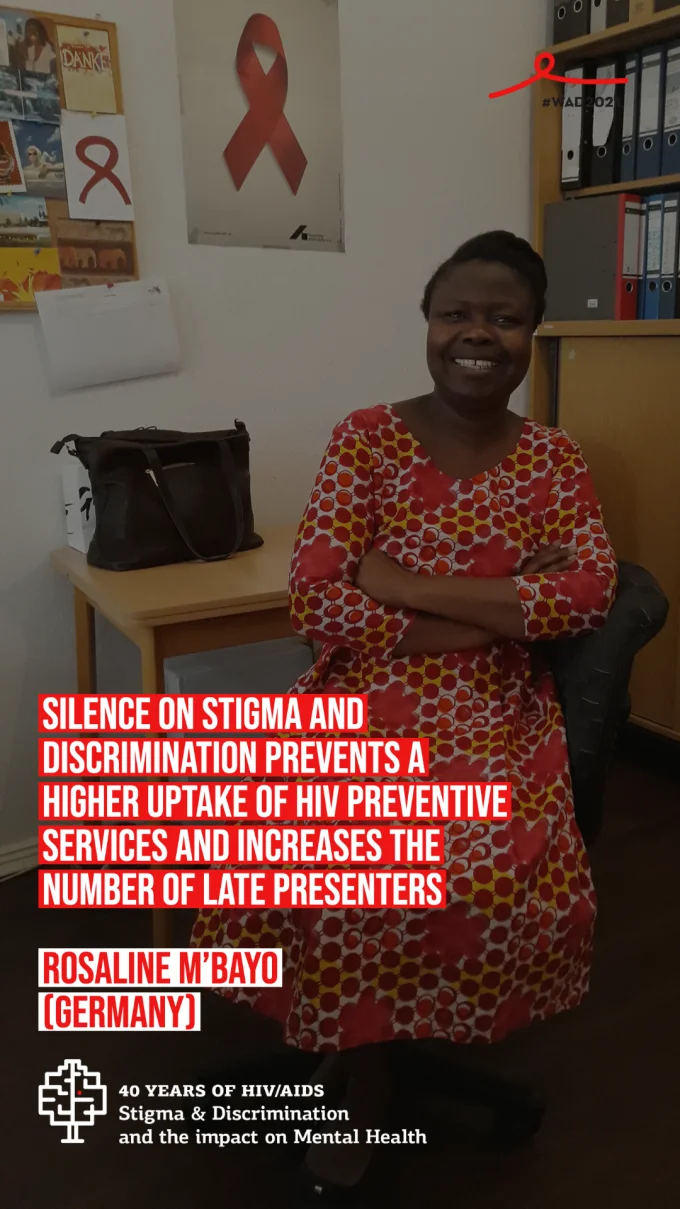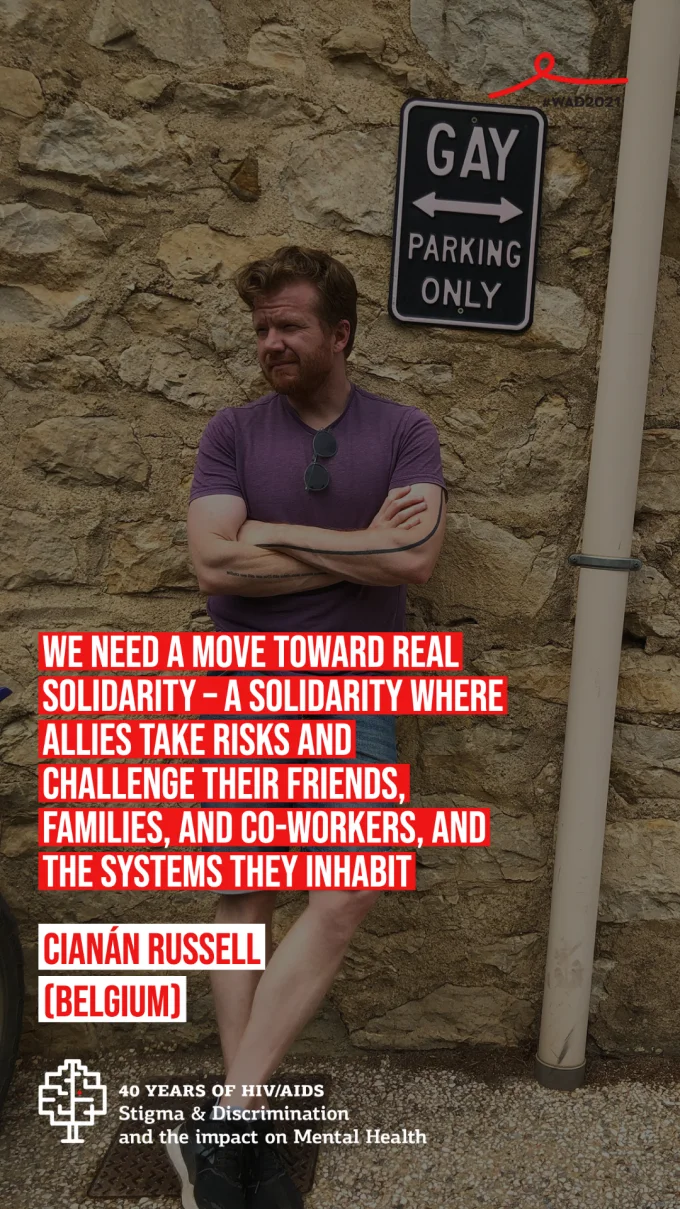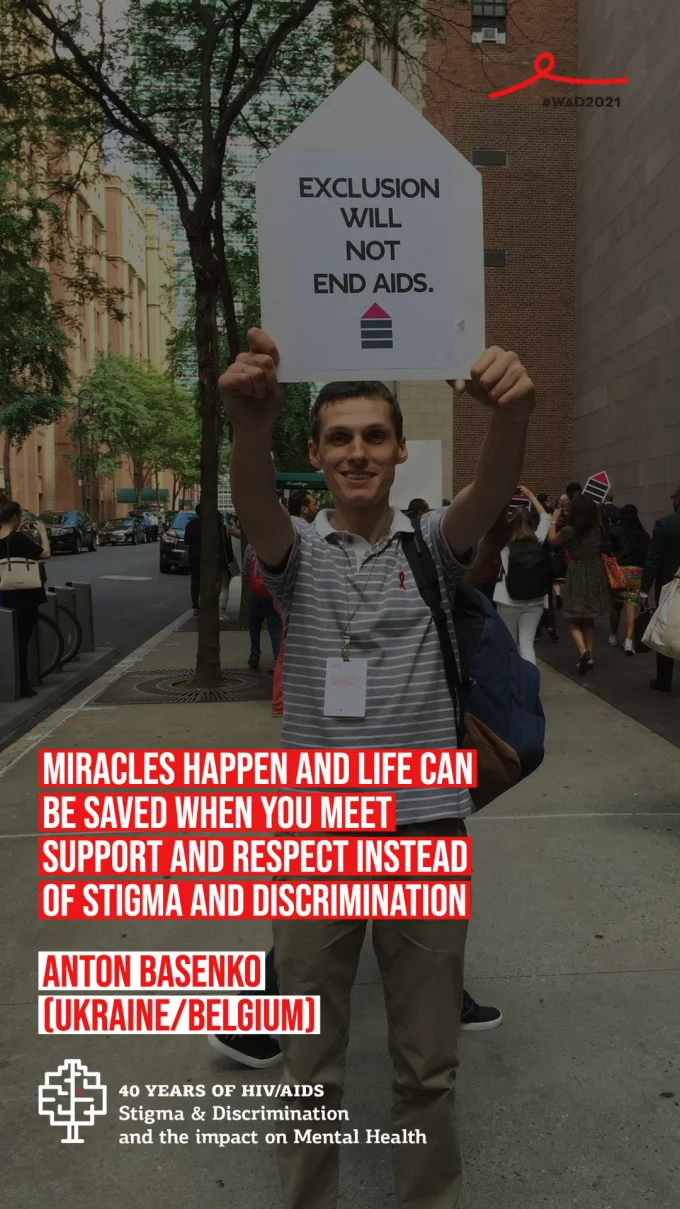40 years of HIV/AIDS: Stigma & Discrimination and the impact on Mental Health
- May 25, 2022
- 9 min read
Updated: May 26, 2022

40 years after the first HIV/AIDS case and as we are experiencing a new pandemic, we are still faced with challenges stemming from the social perception of HIV/AIDS and related prejudices.
There has been enormous scientific progress and now we have the experience and tools to prevent new transmissions and to improve health outcomes of people living with HIV. However, stigma and discrimination still hinder access to healthcare and impact the well-being and mental health of key populations. Stigma and discrimination limit our capacity to curb or eliminate and control pandemics and socially significant communicable diseases.

This World AIDS Day
EATG launches a campaign to raise awareness around persistent stigma and discrimination faced by people living with and communities affected by HIV/AIDS and the impact on their lives and mental health. Furthermore, we aim to foster different EU institutions’ interest to act on HIV, human rights and stigma-related issues. With this campaign, we present stories of people living with and communities affected by HIV coming from different realities across Europe and Central Asia. Their stories showcase how stigma and discrimination is still a barrier to an effective response. In addition, we present a set of recommended priorities regarding mental health to be acted upon by various stakeholders involved in the HIV/AIDS response and beyond. Finally, we are further promoting the first ever European-wide survey that aims to measure the stigma faced by people living with HIV today. The survey is conducted by ECDC, EATG and AIDS Action Europe.

No place for Stigma and Discrimination: Let’s Break the Silence
Rosaline M’Bayo (Germany) Programme Director at Afrikaherz
Please give us a short introduction of yourself.
My name is Rosaline M’Bayo a nurse, social worker, lecturer, and psychosocial counsellor at Afrikaherz. Over my 22 years of working at Afrikaherz, as a community-based social worker/researcher, I have gained a tremendous experience and insight into the life situations, health-related issues, HIV, and the accompanying problems which African migrants encounter in Berlin, Germany. In 1999, I was a co-founder of The African Women Friendship Association (TAWFA), a self-help group for HIV and AIDS-positive African women and their families. Most recently, I have been appointed as a coordinator for AHGNiD, the German-wide network of African projects and people engaged in HIV and AIDS prevention. In addition, I have also been involved in discourses on ethical aspects and human rights in relation to African migrants living with HIV in Berlin/Germany.
How are you related to the HIV/AIDS field?
Currently, I have been coordinating “Afrikaherz” VIA –Verband für Interkulturelle Arbeit, Berlin/Brandenburg e.V., Germany. The main area of focus is HIV/AIDS prevention, health promotion and psychosocial counselling for migrants from Sub-Saharan Africa.
40 years after the first HIV diagnosis, what would you consider the top priority in the HIV/AIDS field today? Please describe.
Addressing HIV/AIDS-related instances of stigma and discrimination.
How is stigma & discrimination affecting you and the communities you belong to or work with?
HIV is still a taboo in the African communities in Berlin. It is indeed because Africans are disproportionately affected as a minority group. Stigma and discrimination limit the access to healthcare services and have result in a low uptake of HIV prevention services, including the lack of participation in HIV-related activities, as well as self-isolation, constant fear, and depression. Moreover, language barriers and issues with residence permits have devastating effects on the mental health of people living with HIV.
How are mental health issues dealt with in your constituency? What is the impact in the quality of life of people living with HIV?
At Afrikaherz, we offer psychosocial counselling, give information, advice, and promote health care for African migrants. Additionally, we make hospital and home visits for people living with HIV and AIDS. Thanks to our counselling, campaigns, workshops, seminars as well as through detailed knowledge and information, we are able to provide quality support and care for people either affected by or infected with HIV/AIDS. People get to know their rights, which in turn help them to improve their life situations.
What is the one change you wish to see regarding stigma & discrimination and mental health by 2030?
A stigma and discrimination-free society.

A move toward real solidarity with trans people
Cianán Russell (Belgium) Senior Policy Officer at ILGA-Europe
Please give us a short introduction of yourself.
I think of myself primarily as a trans activist. This part of my experience in life has shaped me the most thoroughly, and I am dedicated to the protection and advancement of the rights of trans people. I have been in Brussels since 2019 and have used the pandemic as an opportunity to walk around the city extensively and take pictures of all the flowers I could find (which is a bit difficult in the depth of winter). I grew up in the Midwestern US and have lived in Thailand and Germany before moving to Belgium. I read a lot – for work and for fun, including a lot of history and science fiction. Iam married and live with my feisty cat, Clive.
How are you related to the HIV/AIDS field?
I started my activist life in 1996, working on street outreach to LGBTI youth experiencing homelessness in my hometown in the US. Later, I worked in trans rights and trans-peer support, and then, in 2016, started working, firstly at trans, and then LGBTI regional networks. I worked with the Asia Pacific Transgender Network and Transgender Europe before coming to ILGA-Europe. In all of these roles, the HIV/AIDS response has been an important component of my work, as trans and LGBTI communities around the world are particularly impacted by the epidemic.
40 years after the first HIV diagnosis, what would you consider the top priority in the HIV/AIDS field today? Please describe.
The biggest issue at this point is about implementation – there are many strong products and viable solution-oriented actions, but implementation continues to fail to reach the most marginalised key populations. This is, of course, linked to political will – and in this moment, we are facing a rise in authoritarianism, anti-democratic efforts, and scapegoating of many of these same marginalised groups by political leaders. That does not bode well for the HIV/AIDS response. Therefore, I think the priority needs to be focusing on the larger societal issues that will lead to a better and more sustainable implementation.
How is stigma & discrimination affecting you and the communities you belong to or work with?
Stigma is a long-term reality for trans communities – trans people faced stigma and exclusion long before HIV/AIDS became a reality. This was not always the case in many parts of the world, where the exclusion of trans people and communities from society was a colonial introduction. However, the majority of trans people in Europe and around the world have not lived during times where inclusion was the norm. For trans people, HIV/AIDS presents a second compounding layer of stigma and discrimination, leading to further entrenchment of the difficulties we face in accessing healthcare, but also in access to employment, housing, and social services. It is vital that stigma and discrimination are viewed in their full complexity when we work to dismantle them in regard to HIV/AIDS, because solving only this piece cannot solve the larger problem of exclusion experienced by trans people.
How are mental health issues dealt with in your constituency? What is the impact in the quality of life of people living with HIV?
In 2021, the mental health of trans people is particularly low, as wide-spread media and social media attacks on trans people, as well as increasing reporting of anti-trans murder and violence, reveal the precarity of the gains in the protections of our rights that we have experienced in recent decades. Overall, trans people are exposed to daily realities of the brutal murders of our trans siblings, to verbal abuse online, and even to major media companies uplifting the voices of those who opposed our human rights without a critical reflection on the consequences. Politicians also use us regularly to score political points, leaving us to try to figure out how to protect ourselves as our governments refuse. These issues are heavy, and many of us are emotionally completely exhausted.
What is the one change you wish to see regarding stigma & discrimination and mental health by 2030?
The central issue I would like to see change by 2030 is a move toward real solidarity – a solidarity where allies take risks themselves and challenge their friends, families, and co-workers, and the systems they inhabit. Stigma and discrimination are ultimately a cultural problem, which requires a cultural solution; one in which misconceptions, misinformation, and myths are challenged not only by those affected, but by everyone who is committed to the advancement of human rights for all. Trans people in particular are a small minority, subject to radically outsized scrutiny in the media and throughout society and changing hearts and minds of the majority will require a collective effort.

Mental Health Matters! Especially for people who use drugs or living with HIV
Anton Basenko (Ukraine/Belgium) Programme Manager at EATG
Please give us a short introduction of yourself.
Currently based in Brussels, but I am formerly from Kyiv, Ukraine. I have a master’s degree in international economy. I am a globally known activist for the community of people who use drugs and OST patients, for people living with HIV and lived experience with HCV. In 2010, I started working in the fields of HIV and TB-service, harm reduction and advocacy in local and national NGOs in Ukraine. In 2013, I worked for the international Alliance for Public Health, coordinating international and national projects of HIV, TB, viral hepatitis prevention and treatment among key populations, as well as advising on Communities, Rights and Gender issues. I am also the author of many articles, guidelines and publications for communities and professionals. Founder of PUD.UA. Board member of INPUD and EKHN. Member of the Communities Delegation of the Global Fund Board and CCM of Ukraine. Since 2021 I am the Programme Manager on Quality of Life in the EATG team.
How are you related to the HIV/AIDS field?
I am a person living with HIV for more than 18 years, who has used drugs for more than 20. One day, 12 years ago, when I decided to begin helping other people in similar situations, I started working as a ‘peer educator’ on opioid agonist therapy sites in grass-root organisations in Kyiv. But HIV activism and advocacy have no borders, that is why I continued my work on national, regional and international levels, bringing communities expertise into decision-making processes and contributing to the development of life saving programmes.
40 years after the first HIV diagnosis, what would you consider the top priority in the HIV/AIDS field today? Please describe.
I am fully confident that, though HIV is still not curable, “40 years later…” humanity has all the tools and interventions to effectively prevent HIV and deaths from AIDS. But why are people still getting infected and dying then? Because we have to deal with fundamental, structural and systemic barriers like criminalisation, stigma and discrimination.
How is stigma & discrimination affecting you and the communities you belong to or work with?
All generations of people living with or affected by HIV have grown up and during all those years, they have been under an extreme violation of their mental health, just due to the fact that they existed. They are disrespected, they are considered as criminals and they are faced with the refusal of social help, medical support, and violations of human rights because of “HIVphobia”, “narcophobia” or “transphobia”. It’s time to act!
How are mental health issues dealt with in your constituency? What is the impact in the quality of life of people living with HIV?
Unfortunately, besides separate fragmentary activities of some non-governmental organisations and peer-support, mental health is not dealt at all (at least if we talk about the EECA region). COVID-19 has brought more attention to mental health issues and donors like, for instance, the Global Fund supported mental health services on a more systemic level. But it is still not enough, and even good services are not changing the fact that criminalisation continues to keep those people in segregation and exile.
What is the one change you wish to see regarding stigma & discrimination and mental health by 2030?
The decriminalisation of all key populations and a full stop to the ‘War on Drugs’.

HIV and Mental Health: Recommendations and policy priorities
In 2020 and 2021, EATG carried out a literature review, a community survey on mental health and HIV and convened two workshops to discuss results and implications for health service providers and community organisations. This briefing paper provides a summary of recommendations that emerged from these to improve the provision of mental health services for people living with and affected by HIV in Europe and Central Asia.
Similarly, to what we have witnessed in approaching other complex subjects such as sexual practices, drug use or sex work, the attitudes and knowledge of HIV healthcare professionals regarding mental health vary. HIV specialists are not necessarily comfortable asking specific questions related to mental health symptoms and will not necessarily have the tools to carry out assessments of the mental health of people living with or affected by HIV. Additionally, HIV healthcare professionals are often not aware of the potential impact of mental health on the quality of life of people living with or affected by HIV -including adherence to treatment and risk-taking behaviours.

Credits
Apostolos Kalogiannis Editor-in-chief, Interviews and Production Coordination Nikos Chrisikakis Pre-production, Direction and Video Editing Paris Pateli Title Design and Animation Dimitris Kanellopoulos Visual Identity and Title Design Rocco Pignata Production Assistant, Transcriptions and Proofreading Marine Markaryan Translations The HIV & Mental Health project has been developed by the EATG, and was made possible through a grant from Gilead Sciences, Merck Sharp and Dohme, and ViiV Healthcare Europe Ltd. EATG acknowledges that the sponsors had no control or input into the structure or the content of the initiative.


Comments